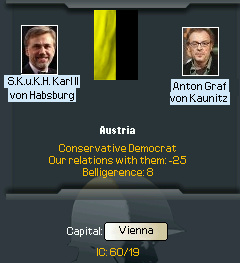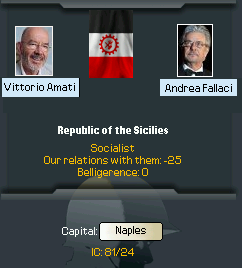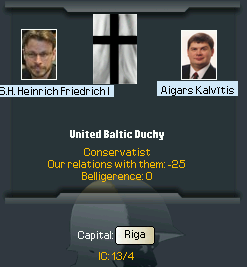A House of Cards (An alternative KR-MDS AAR)
- Thread starter Kurt_Steiner
- Start date
-
We have updated our Community Code of Conduct. Please read through the new rules for the forum that are an integral part of Paradox Interactive’s User Agreement.
You are using an out of date browser. It may not display this or other websites correctly.
You should upgrade or use an alternative browser.
You should upgrade or use an alternative browser.
I notice a lot of people love the Spanish Republic...XD
Good showing of Syndicalist Western Europe, love to see Central and Eastern Europe.
Good showing of Syndicalist Western Europe, love to see Central and Eastern Europe.
Great setup for now, I especially liked how detailed you described the Syndicalist factionalism. I usually make SyNdieZ very solid in spite of ideological diffrences in my scenarios (usually with excuse of external dangers), but what you have done is great simulation of the usual behavior of such Left-Wing movements what makes your AAR even richer in flavor, details and political background.
Btw, how was Spanish Republic able to keep Spanish parts of Morocco, were French Nationalists and Germans too busy with something else to be able to snap them as they usually do? Or was I somehow mislead by colors? It'd be also interesting to see how the Spanish Republic administrates those territories. Maybe it's just a continuity with Moroccan Sultanate turning into a socialist-influenced Republic (at least the Spanish part) and remaining a Spanish protectorate? Also, this Algerian state that controls also Tunisia and part of Morocco looks menacing. I guess that's not National France due to color and lack of territories to the South, I'm eagerly waiting to see the rest of the general setup!
Btw, how was Spanish Republic able to keep Spanish parts of Morocco, were French Nationalists and Germans too busy with something else to be able to snap them as they usually do? Or was I somehow mislead by colors? It'd be also interesting to see how the Spanish Republic administrates those territories. Maybe it's just a continuity with Moroccan Sultanate turning into a socialist-influenced Republic (at least the Spanish part) and remaining a Spanish protectorate? Also, this Algerian state that controls also Tunisia and part of Morocco looks menacing. I guess that's not National France due to color and lack of territories to the South, I'm eagerly waiting to see the rest of the general setup!
Great setup for now, I especially liked how detailed you described the Syndicalist factionalism. I usually make SyNdieZ very solid in spite of ideological diffrences in my scenarios (usually with excuse of external dangers), but what you have done is great simulation of the usual behavior of such Left-Wing movements what makes your AAR even richer in flavor, details and political background.
Aye, the historical evolution within the countries adds a nice flavour; how they all had extremists in office until there was a softenning in the 1970s/1980s.
Surelly looking forward to the rest of the setting.
PS: I'm to assume that this is Urqhart briefing Bush, right? What if he twisted facts for his gain?....
PS: I'm to assume that this is Urqhart briefing Bush, right? What if he twisted facts for his gain?....
Your irony meter will go off with megaton force.
Central Europe, 1920-2003
To begin with this summary we should do as the main character in Günther Grass' "Frau Memingers Liebhaber" and ask ourself wether "if it shouldn't been better for the Kaiserreich to be defeated in 1918". Germany in 1920 was far from being in a hard situation. However, 20 years later the situation was quite different.
By 1940 the happy and indulgent German Reich had discovered that the world had turned against her. Barely surviving the stock market upheaval of 1936, Berlin discovered that not only the Commune of France was armed to the teeth and was quite capable of fighting (and perhaps defeating!) the German Imperial Army, but also succeeding in disrupting the old order in Europe by winning new allies in Spain and destroying Austria's influence in Northern Italy.
Of course, the Austrian troubles were nothing new. Vienna had hardly avoided a civil war after the Ausgleich of 1937, when Hungary pressed for an almost independent status. Just the German threat of intervention in the Austrian side had forced Budapest to return to the negotiations and agreed upon turning the Empire into a Confederation with the Emperor as the visible head of all the components of the new state but with quite autonomous government. In fact, the Confederation was divided into the Austrian sphere of influence (Austria, Bohemia, Bosnia and Galicia-Lodomiera) and the Hungarian one (Hungary and Croatia).
From then on Berlin had to keep a vigilant eye upon his southern neighbourn and be worried about Vienna's failure to avoid incomming disaster, as when France and the Republic of the Two Sicilies managed to destroy the Italian Federation by supporting the leftish groups of saboteurs and then threatening to send their armies when, on July 14th 1937, a group d'etat proclaimed in Milan the "Free Sindicalist State of Northern Italy". The weak government of Stefano Jacini found itself alone when the Pope Pius XI ran away to Austria and fled accordingly. In a matter of six shorts days, the Italian Federation was annexed to the Republic of Two Sicilies and became the Socialist Republic of Italy.
Austria could not act due to Hungary's reluctance to see herself involved in events that were not if her interest. Incensed, the Kaiser Wilhelm II travelled to Vienna and then to Budapest to make quite clear to both governments his opinion about the last events and returned to Berlin with the utmost desire of getting rid of the useless Austrian Emperor and of the traitorous Hungarian faction. In the end, his heir almost got it.
It was Wilhelm III who saw the chance to end the Hungarian independence in 1944. It took seven long years of silent work by the German intelligence service to find a way to depose Admiral Horthy, the Hungarian prime minister, and to replace him by Ferenc Szálasi, a "too rightish winger nuts", as Admiral Canaris, the head of the German Secret Service, called him. He, in turn, was replaced by a more democratic leader, László Ede Almásy de Zsadány et Törökszentmiklós, once Szálsi was killed by a French gunner that fired German bullet fired with an Austrian revolver which had been given to him by a Russian spy.
Thus, by 1945, Hungary returned to the Austria's influence and Central Europe was calm again. Or so so.

The new unified Italian state, arbitrarily called the Republic of the Siciles, the Republic of the Two Scilies, the Italian Syndicalist Republic and the Italian Republic of the Sindicalist Sicilies (or, in words of Oswald Mosley, the Italian Genital ulcer), became a source of amusement, derriment and terror for the forty following years after the "unification week" of 1937. To be led by Palmiro Togliatti was bad enough for the Republic, as Togliatti was despised by his two main rivals, the social-anarchist Filippo Turati and the bolshevik-national-syndicalist Benito Mussolini.
As if the politics of the Rpublic were not messy enough, France decided to control their neighbour through his ambassador, André Malraux. However, Malraux was disliked by Togliatti because the ambassador was too "flamboyant". Then Paris make the fatal mistake of replacing him with André Marty.
Marty was a psycopath who saw Capitalist spies everywhere: Mussolinni was nothing but a German agent, so Marty had him "vanish"; Turati was nothing but an Austria double agent, so he followed Mussolinni's steps. Pietro Nenni, another Syndicalist leader, was killed in his home by unknown gunners. In short: when Marty was recalled (and shoot!) to France three years later, in 1956, 500 people had been killed by his orders. Thus, it was no surprise that Italy remained in peace after he was gone: all those capables of causing trouble were either dead, had disappeared or were afraid of going out of home. It was not until 1961 when the Twelve Congress of the Greater Italian Union denounced Togliatti's legacy when Italy returned to a peaceful state and began its slow drift into a moderate regime.

Meanwhile, in the North, Norway suffered a silent revolution that turned her into a Syndicalist heaven in 1939, to Germany's horror. Almost at once Berlin began to undone what has happened, with the full cooperation of Denmark -which had not the slightest intention of being the next "syndicalized" country- and Sweden -that had not that intention either and that felt the danger too close to their taste. If we add that the new Leftish govermnet wanted nothing with neither Paris nor London and remained outside of the Internationale, we cannot be surprised if, in just ten years, the Norwegian Syndicalism came to its defeat when their policy of political liberalization produced a cliché of "almost social democrats" politicians led by Oscar Torp and Einar Gerhardsen, that ended the Syndicalist period.
Cleared the North, now Germany had 'only' to worry about Eastern Europe. The events in that corner of the world may explain why the German emperor hates with friendly passion his cousin, the Tzar, because he considers his Russian counterpart to be a warmongering fool (and he's wrong), who, in turn, depises his Austrian cousin because he considers him to be a bloody dictator (and he's wrong), who, in turn, feels that everybody hates him (and he's right).
@H.Appleby: I love making people smile, you must know it.
@Gukpa: But of course my boy! It's an old habit of mine!
@Undead-Hippie: Well, you shall see...
@Razgriz 2K9: It' because of the flag, you know
@zoli1984:... but beneath the surface...
@Asalto: nah, to make them quarrell among them makes it funnier.
The Spanish Republic kept the Spanish Morocco because I was too lazy (and because I forgot) to make something about it...
@Mr. Santiago: That's the influence of me of May 68...
Yes, this is Urqhart briefing Bush. He may be a bit biased... or not...
@Black Watch: Well, to say the truth... no.
@serutan: Interesting way of making humour...

To begin with this summary we should do as the main character in Günther Grass' "Frau Memingers Liebhaber" and ask ourself wether "if it shouldn't been better for the Kaiserreich to be defeated in 1918". Germany in 1920 was far from being in a hard situation. However, 20 years later the situation was quite different.
By 1940 the happy and indulgent German Reich had discovered that the world had turned against her. Barely surviving the stock market upheaval of 1936, Berlin discovered that not only the Commune of France was armed to the teeth and was quite capable of fighting (and perhaps defeating!) the German Imperial Army, but also succeeding in disrupting the old order in Europe by winning new allies in Spain and destroying Austria's influence in Northern Italy.
Of course, the Austrian troubles were nothing new. Vienna had hardly avoided a civil war after the Ausgleich of 1937, when Hungary pressed for an almost independent status. Just the German threat of intervention in the Austrian side had forced Budapest to return to the negotiations and agreed upon turning the Empire into a Confederation with the Emperor as the visible head of all the components of the new state but with quite autonomous government. In fact, the Confederation was divided into the Austrian sphere of influence (Austria, Bohemia, Bosnia and Galicia-Lodomiera) and the Hungarian one (Hungary and Croatia).
From then on Berlin had to keep a vigilant eye upon his southern neighbourn and be worried about Vienna's failure to avoid incomming disaster, as when France and the Republic of the Two Sicilies managed to destroy the Italian Federation by supporting the leftish groups of saboteurs and then threatening to send their armies when, on July 14th 1937, a group d'etat proclaimed in Milan the "Free Sindicalist State of Northern Italy". The weak government of Stefano Jacini found itself alone when the Pope Pius XI ran away to Austria and fled accordingly. In a matter of six shorts days, the Italian Federation was annexed to the Republic of Two Sicilies and became the Socialist Republic of Italy.
Austria could not act due to Hungary's reluctance to see herself involved in events that were not if her interest. Incensed, the Kaiser Wilhelm II travelled to Vienna and then to Budapest to make quite clear to both governments his opinion about the last events and returned to Berlin with the utmost desire of getting rid of the useless Austrian Emperor and of the traitorous Hungarian faction. In the end, his heir almost got it.
It was Wilhelm III who saw the chance to end the Hungarian independence in 1944. It took seven long years of silent work by the German intelligence service to find a way to depose Admiral Horthy, the Hungarian prime minister, and to replace him by Ferenc Szálasi, a "too rightish winger nuts", as Admiral Canaris, the head of the German Secret Service, called him. He, in turn, was replaced by a more democratic leader, László Ede Almásy de Zsadány et Törökszentmiklós, once Szálsi was killed by a French gunner that fired German bullet fired with an Austrian revolver which had been given to him by a Russian spy.
Thus, by 1945, Hungary returned to the Austria's influence and Central Europe was calm again. Or so so.

The new unified Italian state, arbitrarily called the Republic of the Siciles, the Republic of the Two Scilies, the Italian Syndicalist Republic and the Italian Republic of the Sindicalist Sicilies (or, in words of Oswald Mosley, the Italian Genital ulcer), became a source of amusement, derriment and terror for the forty following years after the "unification week" of 1937. To be led by Palmiro Togliatti was bad enough for the Republic, as Togliatti was despised by his two main rivals, the social-anarchist Filippo Turati and the bolshevik-national-syndicalist Benito Mussolini.
As if the politics of the Rpublic were not messy enough, France decided to control their neighbour through his ambassador, André Malraux. However, Malraux was disliked by Togliatti because the ambassador was too "flamboyant". Then Paris make the fatal mistake of replacing him with André Marty.
Marty was a psycopath who saw Capitalist spies everywhere: Mussolinni was nothing but a German agent, so Marty had him "vanish"; Turati was nothing but an Austria double agent, so he followed Mussolinni's steps. Pietro Nenni, another Syndicalist leader, was killed in his home by unknown gunners. In short: when Marty was recalled (and shoot!) to France three years later, in 1956, 500 people had been killed by his orders. Thus, it was no surprise that Italy remained in peace after he was gone: all those capables of causing trouble were either dead, had disappeared or were afraid of going out of home. It was not until 1961 when the Twelve Congress of the Greater Italian Union denounced Togliatti's legacy when Italy returned to a peaceful state and began its slow drift into a moderate regime.

Meanwhile, in the North, Norway suffered a silent revolution that turned her into a Syndicalist heaven in 1939, to Germany's horror. Almost at once Berlin began to undone what has happened, with the full cooperation of Denmark -which had not the slightest intention of being the next "syndicalized" country- and Sweden -that had not that intention either and that felt the danger too close to their taste. If we add that the new Leftish govermnet wanted nothing with neither Paris nor London and remained outside of the Internationale, we cannot be surprised if, in just ten years, the Norwegian Syndicalism came to its defeat when their policy of political liberalization produced a cliché of "almost social democrats" politicians led by Oscar Torp and Einar Gerhardsen, that ended the Syndicalist period.
Cleared the North, now Germany had 'only' to worry about Eastern Europe. The events in that corner of the world may explain why the German emperor hates with friendly passion his cousin, the Tzar, because he considers his Russian counterpart to be a warmongering fool (and he's wrong), who, in turn, depises his Austrian cousin because he considers him to be a bloody dictator (and he's wrong), who, in turn, feels that everybody hates him (and he's right).
@H.Appleby: I love making people smile, you must know it.
@Gukpa: But of course my boy! It's an old habit of mine!
@Undead-Hippie: Well, you shall see...
@Razgriz 2K9: It' because of the flag, you know
@zoli1984:... but beneath the surface...
@Asalto: nah, to make them quarrell among them makes it funnier.
The Spanish Republic kept the Spanish Morocco because I was too lazy (and because I forgot) to make something about it...
@Mr. Santiago: That's the influence of me of May 68...
Yes, this is Urqhart briefing Bush. He may be a bit biased... or not...
@Black Watch: Well, to say the truth... no.
@serutan: Interesting way of making humour...
Last edited:
Lol, Norway silently becomes syndicalist only to silently become a democracy 10 years later, with little foreign intervention, how nordic of them.
Also, you may call Marty a lot of things, unnefective is NOT one of them.
All in all, Europe's allarmingly moderate.
Also, you may call Marty a lot of things, unnefective is NOT one of them.
All in all, Europe's allarmingly moderate.
Shouldn't Otto still be on the throne?
And I'm glad to see that the Hapsburgs remain in control of Eastern Europe.
And I'm glad to see that the Hapsburgs remain in control of Eastern Europe.
Shouldn't Otto still be on the throne?
And I'm glad to see that the Hapsburgs remain in control of Eastern Europe.
Otto I von Habsburg-Lorraine was the Head of Habsburg until his death in 2011, so yes.. He should.
Ah, well the flag is appealing to the eye...it has to be the purple. 
You know, it's weird, They control all of Italy, and yet it's called Republic of the Sicilies...did the number of Sicilies increase since the takeover?
You know, it's weird, They control all of Italy, and yet it's called Republic of the Sicilies...did the number of Sicilies increase since the takeover?
Eastern Europe, 1920-2003
The events related with Eastern Europe were linked with the fortunes and misfortunes of Russia as if the Baltic States, Lithuania, Weissruthenien and Ukraine were worried when the Bear was in disarray and the Syndicalist Plague threatened to conquer the old Empire, they were even more terrified when an erratic Kerensky wanted to undo Russia's fall into nothingness or when the restored Tsar decided to restore the past glory of the Empire.
The United Baltic Duchy and Weissruthenien saw no other option but to seek German protection. The former was helped by the migration of many German citizens to the Baltic: Berlin could not abandon his own people, thus the Kaiserliche Marine began to patrol the Baltic under the false flag of "friendly visits to the Brother Duchy". It was just a question of time that the Heer and the Kaiserliche Luftwaffe deployed some token forces in the Duchy. While they were clearly not enough to defend the country from a Russian onslaught, they were enough to keep the Bear at bay, as any Russian attack would go against German troops and with them, the Reich.
Weissruthenien came under German protection in a different way. A foiled attempt to murder king Vladimir I von Hohenzollern arose such a turmoil in the country -worsened by the sudden illness and death of his younger brother, Prince Sigismund- that for a while it was suspected that both the Syndicalist and the Russian secret services were behind them. Never mind the truth, the unstability forced the Regency council first, and then the young king Frederik and his sucessors, to depend more and more in Berlin. And the Reich never allowed that advantage to vanish.


Ukraine faced a civil war at the same time that Russia had a new Tzar, Kiril Vladimirovich. The Syndicalist attempted another failed revolution that, as in Russia, ended in a civil war (1937-1939) that lasted so long because no one really was interested in it and both sides, Loyalists and Syndicalists, were left to their own devices for a while. In the end Berlin rushed to Kiev's help just to avoit St. Petersburg doing it first. And with that measure Ukraine won the endless hatred of the Tzar.
Russia wasn't iddle, either. Not caring for what happened in rump Poland, nevertheless the Tsarist secret service spent some time making themselves sure that Warsaw was never to accept getting annexed ("united" was the official word) with Lithuania with complete success. Meanwhile the Don-Kuban Union returned to the service of the Tzar in the late 1930s and St. Petersburg prepared itself for a military campaign against the Caucasus and Central Asia that was always postponed because of the delicate economy of the country. Once one problem was solved a new one appeared and, by the time that Russia was again a Great Power, a new Tzar was in charge: new ideas and new times. Old Russia was dead, it was time to create a new one, stronger, happier and more free tha nany other nation in the world. For a while, it was a good idea.
Thus started the silliest competition between Germany and Russia: to be the more democratic state in the world, as Britain, France and the United States had gone down. Thus the Tzar hates his German cousin for his successes and tries to outwitt him whilethe ruler of Berlin prays every day for a meteorite to strike St. Petersburg, with few success to this day, by the way.

Finally, there was the endless rivalry in the Balkans. Once Serbia was finished a as potential power in the region after Weltkrieg and the Third Balkanic War, the mutal hatred between the Iron Guard Romania and Bulgaria has caused many political think-tanks to guarantee some kind of Fourth Balkanic conflict happening (with the happy intervention of Hungary, of course) in each single decade since 1950s only to be delayed by some "unforeseen" event (either a change in regime, a coup d'etat or a futboll match, courtesy all of this of the Abwehr). Greece, meanwhile, keeps and eye on her untrustful neighbours and waits for her time.
@Mr. Santiago: I had to do something about it and, failing my inspiration and historical examples, my sense of humor did the rest.
Don' worry about Europe's moderation. France still exists. And led by a woman
@Asalto: To prove that his Northern cousin is wrong
@H.Appleby: I wanted new faces and Herr Waltz a new name .
.
@Sakura_F: But the problem is that, from time to time, I feel a bit shy of "manipulating" modern people. To twist Hitler is fine, to twist Otto I von Habsburg-Lorraine... it's not.
Notice I'm using George Bush as the only real character in this AAR. And you'll see why in due time...
@Razgriz 2K9: The best pizza comes from Napoli in this ATL
@Gukpa: Just switching some names here and there...
The events related with Eastern Europe were linked with the fortunes and misfortunes of Russia as if the Baltic States, Lithuania, Weissruthenien and Ukraine were worried when the Bear was in disarray and the Syndicalist Plague threatened to conquer the old Empire, they were even more terrified when an erratic Kerensky wanted to undo Russia's fall into nothingness or when the restored Tsar decided to restore the past glory of the Empire.
The United Baltic Duchy and Weissruthenien saw no other option but to seek German protection. The former was helped by the migration of many German citizens to the Baltic: Berlin could not abandon his own people, thus the Kaiserliche Marine began to patrol the Baltic under the false flag of "friendly visits to the Brother Duchy". It was just a question of time that the Heer and the Kaiserliche Luftwaffe deployed some token forces in the Duchy. While they were clearly not enough to defend the country from a Russian onslaught, they were enough to keep the Bear at bay, as any Russian attack would go against German troops and with them, the Reich.
Weissruthenien came under German protection in a different way. A foiled attempt to murder king Vladimir I von Hohenzollern arose such a turmoil in the country -worsened by the sudden illness and death of his younger brother, Prince Sigismund- that for a while it was suspected that both the Syndicalist and the Russian secret services were behind them. Never mind the truth, the unstability forced the Regency council first, and then the young king Frederik and his sucessors, to depend more and more in Berlin. And the Reich never allowed that advantage to vanish.


Ukraine faced a civil war at the same time that Russia had a new Tzar, Kiril Vladimirovich. The Syndicalist attempted another failed revolution that, as in Russia, ended in a civil war (1937-1939) that lasted so long because no one really was interested in it and both sides, Loyalists and Syndicalists, were left to their own devices for a while. In the end Berlin rushed to Kiev's help just to avoit St. Petersburg doing it first. And with that measure Ukraine won the endless hatred of the Tzar.
Russia wasn't iddle, either. Not caring for what happened in rump Poland, nevertheless the Tsarist secret service spent some time making themselves sure that Warsaw was never to accept getting annexed ("united" was the official word) with Lithuania with complete success. Meanwhile the Don-Kuban Union returned to the service of the Tzar in the late 1930s and St. Petersburg prepared itself for a military campaign against the Caucasus and Central Asia that was always postponed because of the delicate economy of the country. Once one problem was solved a new one appeared and, by the time that Russia was again a Great Power, a new Tzar was in charge: new ideas and new times. Old Russia was dead, it was time to create a new one, stronger, happier and more free tha nany other nation in the world. For a while, it was a good idea.
Thus started the silliest competition between Germany and Russia: to be the more democratic state in the world, as Britain, France and the United States had gone down. Thus the Tzar hates his German cousin for his successes and tries to outwitt him whilethe ruler of Berlin prays every day for a meteorite to strike St. Petersburg, with few success to this day, by the way.

@Mr. Santiago: I had to do something about it and, failing my inspiration and historical examples, my sense of humor did the rest.
Don' worry about Europe's moderation. France still exists. And led by a woman
@Asalto: To prove that his Northern cousin is wrong
@H.Appleby: I wanted new faces and Herr Waltz a new name
@Sakura_F: But the problem is that, from time to time, I feel a bit shy of "manipulating" modern people. To twist Hitler is fine, to twist Otto I von Habsburg-Lorraine... it's not.
Notice I'm using George Bush as the only real character in this AAR. And you'll see why in due time...
@Razgriz 2K9: The best pizza comes from Napoli in this ATL
@Gukpa: Just switching some names here and there...
Last edited:
Wow, not only authoritarian-leaning German Empire, even the two among the most extremist regimes in KR world liberalized a lot! Then there is Lapua Movement and Iron Guard not in power in Finland and Romania anymore? Also, Ray Wise as king of Belarus ftw! ^^
Also, surviving United Baltic Duchy...holy crap, I guess Germany doesn't like the Baltic. O_O
But yeah that does perplex me, if the Iron Guard isn't in power in Romania, why the Iron Guard flag?
But yeah that does perplex me, if the Iron Guard isn't in power in Romania, why the Iron Guard flag?
You said that GGWB is the only real character. Not exactly so. Putin, Iliescu and Yanukovych also exist IRL.



